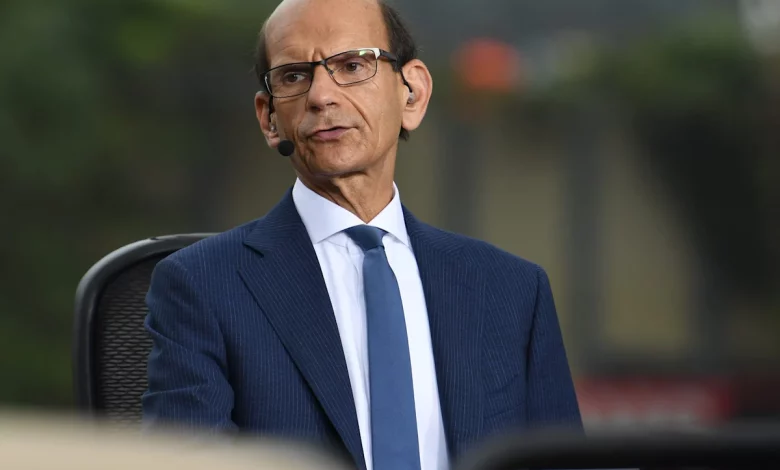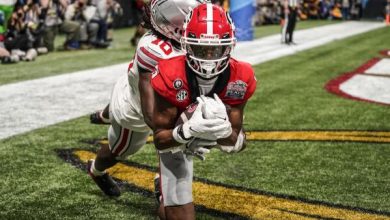The ‘Real Death Valley’ debate is reignited by Paul Finebaum with a Clemson fan on live broadcast.

The debate over which stadium in college football truly deserves the title of “Real Death Valley” has been a source of contention for years, but it was reignited with fiery passion during a live broadcast when Paul Finebaum, one of the most well-known and influential figures in college football media, engaged in a heated discussion with a Clemson Tigers fan. The clash over the rightful owner of the “Real Death Valley” moniker quickly became a viral moment, sparking debate across fanbases, media outlets, and social platforms.
The issue, which pits Clemson’s Memorial Stadium against LSU’s Tiger Stadium, is as much about pride and tradition as it is about football superiority. Both stadiums boast rich histories, passionate fanbases, and legendary atmospheres, but only one can claim the coveted title. For years, LSU fans have maintained that Tiger Stadium is the rightful “Death Valley,” while Clemson fans passionately argue that their Memorial Stadium, known as “Death Valley,” holds the true claim to the nickname.
This debate has been amplified by Finebaum’s presence on air, where his comments have not only stoked the flames but also drawn significant media attention. As one of the most prominent sports analysts in the country, Finebaum has a unique ability to sway public opinion and raise the stakes of any argument he engages in. In this article, we’ll explore the origins of the “Real Death Valley” debate, analyze the exchange between Finebaum and the Clemson fan, and discuss why the debate continues to hold such significance in college football culture.
The Origins of the ‘Death Valley’ Nickname
Before delving into the specific exchange on Finebaum’s show, it’s important to understand the origins of the “Death Valley” nickname and why it has become so contentious. The term “Death Valley” was first coined for LSU’s Tiger Stadium, but both LSU Tigers and Clemson Tigers fans have long claimed ownership of the nickname.
LSU’s Tiger Stadium
Tiger Stadium, located in Baton Rouge, Louisiana, has earned its own set of legendary credentials. Home to the LSU Tigers, it is often regarded as one of the most challenging places to play in all of college football due to the intense atmosphere created by the passionate LSU fanbase. The nickname “Death Valley” was first used in reference to the stadium in 1959 when legendary coach Paul Dietzel dubbed the venue “Death Valley” following an LSU victory over Ole Miss.
The intimidating environment at Tiger Stadium is well-known, especially at night, when the atmosphere is amplified by the raucous “Geaux Tigers” chants and the deafening noise from tens of thousands of fans. The night games in Baton Rouge are legendary, with some even claiming that Tiger Stadium has an almost supernatural quality that causes opposing teams to falter.
Clemson’s Memorial Stadium
Clemson, South Carolina, is home to Memorial Stadium, another college football environment known for its noise, passion, and tradition. Clemson fans began calling their home field “Death Valley” in 1948 after a Sports Illustrated writer referred to the stadium as “Death Valley” during a broadcast of a game between Clemson and South Carolina. The nickname quickly gained popularity among Clemson fans, and it has remained a point of pride ever since.
Memorial Stadium, which seats over 80,000 fans, is known for its famous “Clemson roar”, a tradition that gives the stadium a distinctive home-field advantage. The Tigers’ fans pack the stands and generate a noise level that is said to rival some of the loudest stadiums in college football, including Tiger Stadium in Baton Rouge. Over time, Clemson’s Memorial Stadium has developed a reputation for being one of the toughest environments for visiting teams.
The Reignition of the Debate: Paul Finebaum and the Clemson Fan
The “Real Death Valley” debate has simmered for years, but it reached a new level of intensity when Paul Finebaum and a Clemson fan engaged in a live broadcast conversation that quickly became an internet sensation. Finebaum, known for his provocative commentary and ability to stir the pot, found himself in a heated exchange with a Clemson fan, and the debate over the true “Death Valley” was front and center.
The Exchange on Live Broadcast
The confrontation began during an appearance on The Paul Finebaum Show, a popular radio show and television broadcast where Finebaum interacts with fans, coaches, and analysts from across the college football landscape. In this particular episode, Finebaum took a call from a passionate Clemson fan who expressed that Memorial Stadium was, without a doubt, the “Real Death Valley.” According to the fan, Clemson’s fanbase, traditions, and the intimidating atmosphere created at Memorial Stadium made it the rightful owner of the title.
Finebaum, who is well-known for stirring controversy, quickly challenged the fan’s assertion, citing LSU’s storied history with Tiger Stadium, the “Death Valley” nickname, and the countless memorable moments that have unfolded in Baton Rouge. Finebaum emphasized LSU’s consistent success, particularly during night games, as evidence that Tiger Stadium truly deserves the moniker of “Real Death Valley.”
Tensions Escalate
As the conversation progressed, tensions escalated, with both Finebaum and the Clemson fan passionately defending their respective sides. The Clemson fan argued that LSU had “borrowed” the nickname and was essentially co-opting a title that rightfully belonged to Memorial Stadium. He highlighted the significance of the nickname for Clemson, referencing the tradition and the success the team had achieved while playing in “Death Valley.”
Finebaum, not one to back down from an argument, countered with LSU’s history, citing the team’s success in “The Real Death Valley”, particularly in high-profile games such as their 2019 National Championship run, where LSU’s home-field advantage was a key factor in their success. He also mentioned how LSU’s “Death Valley” had become synonymous with the biggest upsets and the most electric atmospheres in college football history.
The debate reached a boiling point when the fan accused Finebaum of being biased toward LSU, given his history with SEC football. Finebaum, ever the consummate professional, remained calm but firm, reiterating his position that LSU’s Tiger Stadium was unquestionably the “Real Death Valley.” He argued that no other stadium in the country had the same level of mystique and history as Tiger Stadium, making it the definitive holder of the title.
Why This Debate Still Matters
The “Real Death Valley” debate is about much more than just a nickname for two stadiums—it is about identity, pride, and the culture of college football itself. For fans of both teams, claiming the title of “Death Valley” is a badge of honor that represents decades of tradition, success, and an undying loyalty to their respective programs.
LSU Tigers: A Legacy of Dominance
LSU fans argue that Tiger Stadium has earned the right to be called “Death Valley” due to its history, especially the way it has become a symbol of the LSU Tigers’ dominance in the SEC. Over the years, the Tigers have consistently been a powerhouse in college football, particularly in the tough Southeastern Conference, and their home field advantage has played a major role in that success.
From legendary players like Joe Burrow to historic games that have changed the landscape of college football, Tiger Stadium has repeatedly proven itself to be one of the most intimidating venues in all of sports. LSU’s dominance at night games—where the atmosphere reaches a fever pitch—has become synonymous with the “Death Valley” moniker.
Clemson Tigers: A Legacy of Tradition
On the other hand, Clemson fans argue that Memorial Stadium has earned the right to the title due to its long-standing tradition, the intensity of the Clemson Tigers’ fanbase, and the significant role it has played in the team’s rise to prominence in recent years. Under the guidance of head coach Dabo Swinney, Clemson has transformed into one of college football’s elite programs, winning two national championships in the past decade.
Clemson’s dominance at home games, especially in the playoffs, has solidified Memorial Stadium’s place in college football history. The “Clemson roar” that greets teams as they run down the hill before each game is iconic, and the passion of Clemson fans creates an atmosphere that is as electrifying as it is intimidating.
The Larger Symbolism of the Debate
At its core, the “Real Death Valley” debate represents the essence of college football: tradition, loyalty, and a sense of belonging. Both LSU and Clemson fans have a deep connection to their teams, and the pride they take in their home stadiums reflects the larger cultural identity of college football.
While Finebaum’s commentary may have reignited the debate in the national spotlight, it is clear that the true “Real Death Valley” will always be subjective—each team’s fans will continue to argue that their stadium is the rightful holder of the title. And in the end, that’s what makes college football so special: the passionate fans, the traditions, and the eternal rivalries that define the sport.
The “Real Death Valley” debate may never be fully resolved, but it serves as a reminder of what makes college football so unique. The passion, the traditions, and the fierce loyalty of the fanbases of both LSU Tigers and Clemson Tigers will ensure that this argument continues for years to come. Whether on the field or in the broadcast booth, the debate will likely remain a central theme in discussions surrounding college football. One thing is for certain—Tiger Stadium and Memorial Stadium will continue to stand as two of the most iconic venues in all of college sports, each with its own claim to the “Death Valley” legacy.









